Community Empowerment: The Heart of Prevention
Jasmine Zapata aims to improve health outcomes by reaching minority children through through poetry and music.
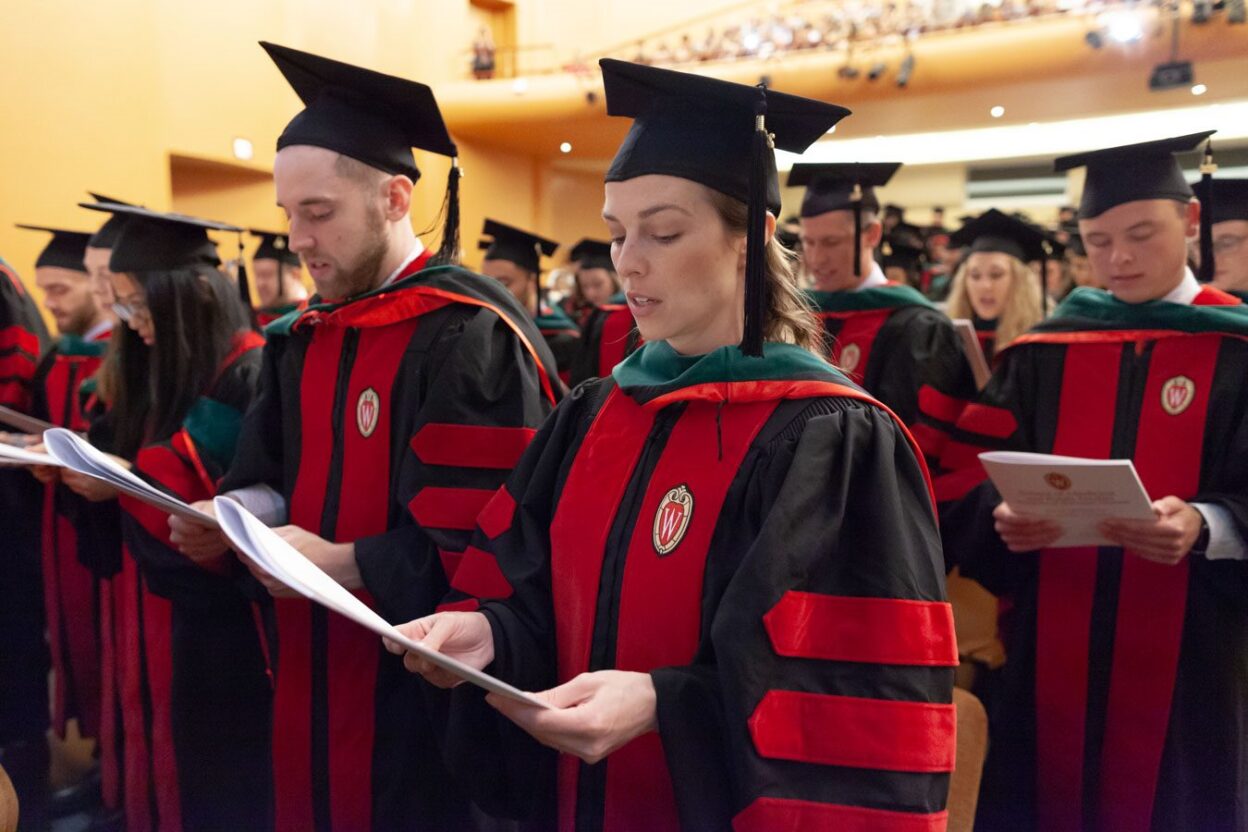
Four years ago, Arian Frost was a first-year medical student standing in line at Memorial Union waiting to go on stage as her grandmother watched.
Along with her entire incoming class, the Bainbridge Island, Washington, native received a white coat at a ceremony prior to the first day of classes in the Doctor of Medicine Program at the University of Wisconsin School of Medicine and Public Health.
“It felt like I was becoming part of something,” Frost said. “Like I was part of a club.”
On May 11, Frost was back at the same stage – with her grandmother, again, watching – four years older and having traded in her hip-length white coat for a calf-length black and red graduation robe.
“Surreal,” she said. “It’s a really big sense of accomplishment; we’ve been working for this for four years, and here we are.”
Witnessing Frost’s commencement was particularly meaningful for her grandmother, who had been the only one among her siblings to graduate from college.
“I am very happy my grandma was able to view both ceremonies,” Frost said.
Brittany McAdams, who earned her MD and Master of Public Health degree, will be heading to Oregon Health & Science University with her classmate and husband, Max Rusek, for their residencies. Expressing elation at entering the field of family medicine, McAdams shared her thoughts about meaningful aspects of her experiences while pursuing her degrees.
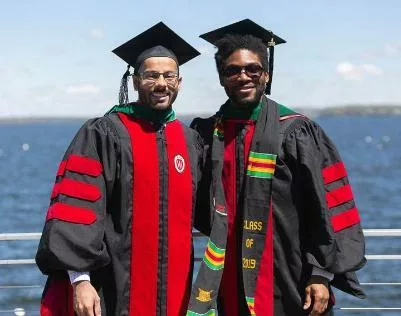
“I feel immense gratitude for the quality and depth of my peer group, and all of the inspiring mentors who I met throughout my five years at the UWSMPH. These relationships have shown me a model for blending clinical care and public health, and have been foundational for my decision to become a family medicine physician,” said McAdams.
“Congratulations, doctors,” said Daniel Jackson, MD, Wisconsin Medical Alumni Association president and associate professor of pediatrics, addressing the students in the standing-room-only theater. “Sounds good, doesn’t it?”
“After 20-plus years of education, your education is really just beginning,” said Dean Robert N. Golden, MD, during his address to the students.
In addition to Jackson and Golden, the ceremony included speeches by faculty members and students chosen by the 2019 MD class. Erik Ranheim, MD, PhD, professor (CHS) of pathology and laboratory medicine, delivered the faculty speech. Matt Guerrieri provided the student address.
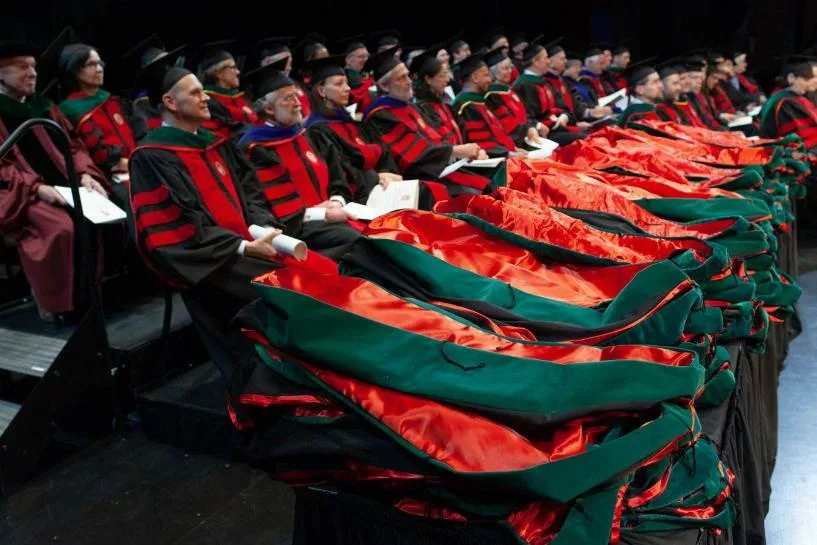
Ranheim acknowledged the challenges facing the graduates. These include changes in physician-patient relationships due to increased skepticism of scientific evidence, and societal threats to patient well-being due to rising rates of suicide and drug and alcohol abuse. In the workplace, physicians face increasing pressures that in recent years have been linked to spikes in national rates of physician burnout and a disturbing rise in physician suicides, he said.
He encouraged and challenged the newest group of physicians not to be overwhelmed by the task before them, but rather to leverage their role and build trust by focusing on helping one patient at a time regain a sense of dignity.
“Do not forget what you can do – what you will do – is sacred. As functional as pulley and buttonhole, yes, but sacred,” he said, referring to the Naomi Nye poem, “Famous.”
Guerrieri used his address to reflect on each of the four years most medical students spend in medical school.

A key message was to bear witness to and be present for people in their most vulnerable moments.
“The value of being humble is one of the most important lessons we have learned,” he said.
Guerrieri noted that after four years of intense effort in classroom studies and clinical training, as well as interviews for the match process, the realization that he and his classmates have obtained their degrees is sinking in, but being on stage was still a little disorienting.
“To be here in this oversized, really hot, funny gown … is totally surreal,” he said. “It feels like we were here five minutes ago sweating in our white coats for the first time.”
The brilliant sunshine and cloudless sky on a cool spring day provided a perfect backdrop for photos, camaraderie and celebration among family, friends and educators as they spilled out onto the historic Memorial Union Terrace, on the Lake Mendota shoreline, after the program concluded.
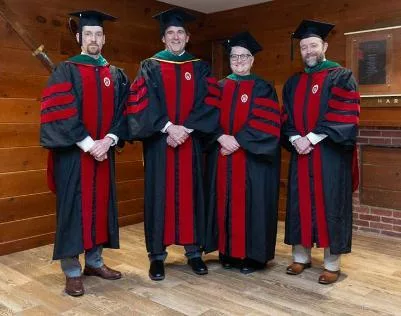
In total, 189 students graduated from the MD program from all over the United States and the world. Students came from many states, including Wisconsin, New Jersey, California, Minnesota, North Carolina, Illinois and Arkansas, and international locations such as Nepal and Iraq. Of the total graduating class:
In the lead-up to the hooding ceremony, two graduates were featured for their unique paths to medical school.
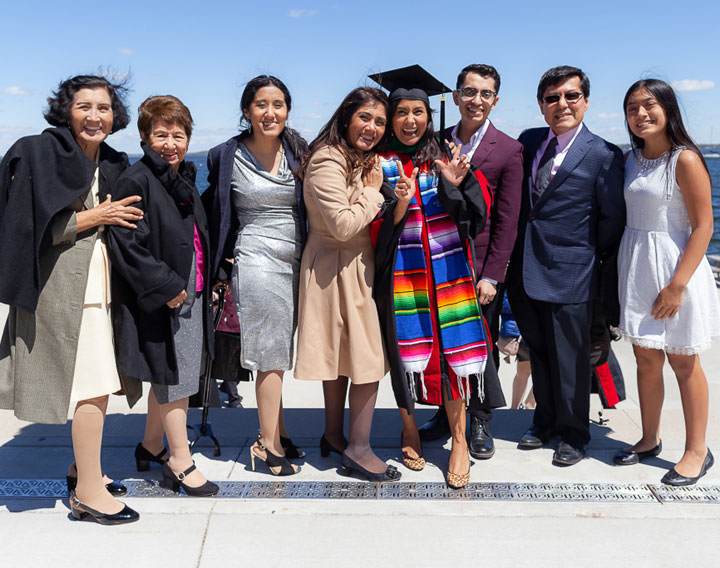
Health professions degree programs throughout the school marked commencement with a variety of recognition programs. In addition to the Doctor of Medicine degree, other health professions degree programs administered by the UW School of Medicine and Public Health include:
More than a dozen master of science and PhD programs are affiliated with the School of Medicine and Public Health, but those degrees are conferred by the UW–Madison Graduate School.
Several School of Medicine and Public Health offices and student organizations, including the Office of Multicultural Affairs and the Native American Center for Health Professions, also held special graduation-related ceremonies with students’ families and friends.
Later in the evening of May 10 at the Kohl Center, UW–Madison Chancellor Rebecca Blank highlighted two School of Medicine and Public Health graduate degree students in her address at the university’s commencement for PhD, medical degree and honorary degree candidates. Blank emphasized the success of Andy Voter, who earned a PhD in biochemistry studying under James Keck, PhD, associate dean for basic sciences and professor of biomolecular chemistry, and Jeannette Metzger, who earned a PhD in cellular and molecular pathology, studying in the lab of Marina Emborg, MD, PhD, professor of medical physics and Parkinson’s disease researcher at the Wisconsin National Primate Research Center.
Billy Bruggink, from Oostburg, Wisconsin, graduated from the Physical Therapy Program. He soon will begin a year-long residency through Concordia University and Advocate Aurora Health.
Like all health sciences programs, the Physical Therapy Program offers unique learning experiences beyond the classroom and patient care settings. One such opportunity gave Bruggink the most lasting memory of his time at UW–Madison.
Bruggink worked with GoBabyGo, an outreach program in which UW physical therapy, occupational therapy and engineering students partner with American Family Children’s Hospital therapists to adapt toy ride-on cars for children with physical and developmental disabilities. The modifications are designed to foster each child’s joy in self-propelled movement.
“The moment that a child realizes the ability to move and explore through something you helped create is powerful,” Bruggink said.